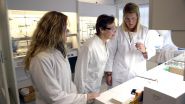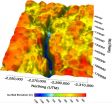(Press-News.org) Philadelphia, PA, September 30, 2014 – On Star Trek, it is easy to take for granted the incredible ability of futuristic doctors to wave small devices over the heads of both humans and aliens, diagnose their problems through evaluating changes in brain activity or chemistry, and then treat behavior problems by selectively stimulating relevant brain circuits.
While that day is a long way off, transcranial magnetic stimulation (TMS) of the left dorsolateral prefrontal cortex does treat symptoms of depression in humans by placing a relatively small device on a person's scalp and stimulating brain circuits. However, relatively little is known about how, exactly, TMS produces these beneficial effects.
Some studies have suggested that TMS may modulate atypical interactions between two large-scale neuronal networks, the frontoparietal central executive network (CEN) and the medial prefrontal-medial parietal default mode network (DMN). These two functional networks play important roles in emotion regulation and cognition.
In order to advance our understanding of the underlying antidepressant mechanisms of TMS, Drs. Conor Liston, Marc Dubin, and their colleagues conducted a longitudinal study to test this hypothesis.
The researchers used functional magnetic resonance imaging in 17 currently depressed patients to measure connectivity in the CEN and DMN networks both before and after a 25-day course of TMS. They also compared the connectivity in the depressed patients with a group of 35 healthy volunteers.
TMS normalized depression-related hyperconnectivity between the subgenual cingulate and medial prefrontal areas of the DMN, but did not alter connectivity in the CEN.
Liston, an Assistant Professor at Weill Cornell Medical College, further details their findings, "We found that connectivity within the DMN and between nodes of the DMN and CEN was elevated in depressed individuals compared to healthy volunteers at baseline and normalized after TMS. Additionally, individuals with greater baseline connectivity with subgenual anterior cingulate cortex – an important target for other antidepressant modalities – were more likely to respond to TMS."
These findings indicate that TMS may act, in part, by selectively regulating network-level connectivity.
Dr. John Krystal, Editor of Biological Psychiatry, comments, "We are a long way from Star Trek, but even the current ability to link brain stimulation treatments for depression to the activity of particular brain circuits strikes me as incredible progress."
Dubin, also an Assistant Professor at Weill Cornell Medical College, adds, "Our findings may inform future efforts to develop personalized strategies for treating depression with TMS based on the connectivity of an individual's default mode network. Further, they may help triage to TMS only those patients most likely to respond."
INFORMATION:
The article is "Default Mode Network Mechanisms of Transcranial Magnetic Stimulation in Depression" by Conor Liston, Ashley C. Chen, Benjamin D. Zebley, Andrew T. Drysdale, Rebecca Gordon, Bruce Leuchter, Henning U. Voss, B.J. Casey, Amit Etkin, and Marc J. Dubin (doi: 10.1016/j.biopsych.2014. 01.023). The article appears in Biological Psychiatry, Volume 76, Issue 7 (October 1, 2014), published by Elsevier.
Notes for editors
Full text of the article is available to credentialed journalists upon request; contact Rhiannon Bugno at +1 214 648 0880 or Biol.Psych@utsouthwestern.edu. Journalists wishing to interview the authors may contact Dr. Conor Liston at +1 646 962 6154 or col2004@med.cornell.edu, or Dr. Marc J. Dubin at +1 212 746 5817 or mrd9035@med.cornell.edu.
The authors' affiliations, and disclosures of financial and conflicts of interests are available in the article.
John H. Krystal, M.D., is Chairman of the Department of Psychiatry at the Yale University School of Medicine, Chief of Psychiatry at Yale-New Haven Hospital, and a research psychiatrist at the VA Connecticut Healthcare System. His disclosures of financial and conflicts of interests are available here.
About Biological Psychiatry
Biological Psychiatry is the official journal of the Society of Biological Psychiatry, whose purpose is to promote excellence in scientific research and education in fields that investigate the nature, causes, mechanisms and treatments of disorders of thought, emotion, or behavior. In accord with this mission, this peer-reviewed, rapid-publication, international journal publishes both basic and clinical contributions from all disciplines and research areas relevant to the pathophysiology and treatment of major psychiatric disorders.
The journal publishes novel results of original research which represent an important new lead or significant impact on the field, particularly those addressing genetic and environmental risk factors, neural circuitry and neurochemistry, and important new therapeutic approaches. Reviews and commentaries that focus on topics of current research and interest are also encouraged.
Biological Psychiatry is one of the most selective and highly cited journals in the field of psychiatric neuroscience. It is ranked 5th out of 135 Psychiatry titles and 14th out of 251 Neurosciences titles in the Journal Citations Reports® published by Thomson Reuters. The 2013 Impact Factor score for Biological Psychiatry is 9.472.
About Elsevier
Elsevier is a world-leading provider of information solutions that enhance the performance of science, health, and technology professionals, empowering them to make better decisions, deliver better care, and sometimes make groundbreaking discoveries that advance the boundaries of knowledge and human progress. Elsevier provides web-based, digital solutions — among them ScienceDirect, Scopus, Elsevier Research Intelligence and ClinicalKey — and publishes nearly 2,200 journals, including The Lancet and Cell, and over 25,000 book titles, including a number of iconic reference works.
The company is part of Reed Elsevier Group PLC, a world-leading provider of professional information solutions in the Science, Medical, Legal and Risk and Business sectors, which is jointly owned by Reed Elsevier PLC and Reed Elsevier NV. The ticker symbols are REN (Euronext Amsterdam), REL (London Stock Exchange), RUK and ENL (New York Stock Exchange).
Selectively rewiring the brain's circuitry to treat depression
A new study in Biological Psychiatry reports how magnetic stimulation treatment works
2014-09-30
ELSE PRESS RELEASES FROM THIS DATE:
New material steals oxygen from the air
2014-09-30
Researchers from the University of Southern Denmark have synthesized crystalline materials that can bind and store oxygen in high concentrations. Just one spoon of the substance is enough to absorb all the oxygen in a room. The stored oxygen can be released again when and where it is needed.
We do fine with the 21 per cent oxygen in the air around us. But sometimes we need oxygen in higher concentrations; for example lung patients must carry heavy oxygen tanks, cars using fuel cells need a regulated oxygen supply. Perhaps one day in the future even sunlight-driven "reversible" ...
Low-birth-weight children are particularly vulnerable to environmental influences
2014-09-30
Low birth weight children are more vulnerable to environmental influences than infants born with normal weight. When brought up with a great deal of sensitivity, they will be able to catch up in school, but on average they will not become better students than normal birth weight children. This result, provided by an international psychologist team, has confirmed the so-called diathesis-stress model of development for low birth weight populations. The researchers report their findings in the Journal of Child Psychology and Psychiatry.
Theories on how environmental factors ...
Genetic test would help 'cut bowel cancer spread'
2014-09-30
Screening families of patients with bowel cancer for a genetic condition would cut their risk of developing bowel, womb, and ovarian cancers, new research has found.
In a major study, Dr Ian Frayling from Cardiff University's School of Medicine and researchers from the University of Exeter's Medical School assessed the effectiveness of introducing a UK-wide screening programme for a genetic condition known as Lynch Syndrome.
Lynch syndrome is a caused by changes in genes which check the spelling in DNA. The condition increases the risk of people developing cancer, ...
Bacteria may have ability to reduce impact of diazepam on UK river environments
2014-09-30
The natural photo degradation of diazepam (valium) and similar medicines – followed by bacterial breakdown – may reduce their potentially harmful impact on the UK's freshwater environment, a team of researchers has said.
Diazepam – used to treat anxiety and other similar conditions – has been detected in rivers across the UK and Europe, having been released from waste water treatment plants. At the levels recorded, it has the potential to produce harmful ecological effects in surface waters, including changing the behaviour of fish shoals and their ability to sense danger ...
Entanglement made tangible
2014-09-30
Quantum entanglement refers to the "pairing" of two subatomic particles in such a way that they form a whole quantum system. Interest in entanglement is increasing today, as it challenges the foundations of quantum mechanics itself, and is also key for achieving quantum information processing and communication. Entanglement is thought to exist up to the everyday, or "macroscopic" realm – according to the predictions of quantum physics – but experimental proposals to show this often involve conditions that are difficult to achieve in today's labs. Publishing in Physical ...
Shape up quickly -- applies to fish, too!
2014-09-30
Fish can live in almost any aquatic environment on Earth, but when the climate changes and temperatures go up many species are pushed to the limit. The amount of time needed to adjust to new conditions could prove critical for how different species cope in the future, reveals a new study from researchers at the University of Gothenburg, published in the scientific journal Proceedings of the Royal Society B.
Climate change continues apace thanks to increasing levels of greenhouse gases in the atmosphere. The greenhouse effect has led not only to an increase in average ...
Dietary polyunsaturated fatty acids linked to smaller risk of coronary heart disease
2014-09-30
A recent study completed at the University of Eastern Finland shows that dietary polyunsaturated fatty acids may reduce the risk of coronary heart disease. The sources of polyunsaturated fatty acids include fish, vegetable oils, and nuts. The findings were published in Arteriosclerosis, Thrombosis & Vascular Biology, an esteemed journal of the American Heart Association.
Recent studies have not found an association between the consumption of saturated fats and the risk of cardiovascular diseases. It seems that the mere reduction of saturated fats from the diet does not ...
On the trail of the truffle flavor
2014-09-30
This news release is available in German. FRANKFURT. Truffles, along with caviar, are among the most expensive foods in the world. Because they grow underground, people use trained dogs or pigs to find them. But the distinctive smell of truffles is not only of interest to gourmets. A group of German and French scientists under the direction of the Goethe University Frankfurt have discovered that the smell of white truffles is largely produced by soil bacteria which are trapped inside truffle fruiting bodies.
White truffles from the Piedmont region in Italy can reach ...
NASA ocean data shows 'climate dance' of plankton
2014-09-30
The greens and blues of the ocean color from NASA satellite data have provided new insights into how climate and ecosystem processes affect the growth cycles of phytoplankton—microscopic aquatic plants important for fish populations and Earth's carbon cycle.
At the bottom of the ocean's food chain, phytoplankton account for roughly half of the net photosynthesis on Earth. Their photosynthesis consumes carbon dioxide and plays a key role in transferring carbon from the atmosphere to the ocean. Unlike the plant ecosystems on land, the amount of phytoplankton in the ocean ...
NASA support key to glacier mapping efforts
2014-09-30
Thanks in part to support from NASA and the National Science Foundation, scientists have produced the first-ever detailed maps of bedrock beneath glaciers in Greenland and Antarctica. This new data will help researchers better project future changes to glaciers and ice sheets, and ultimately, sea level.
Researchers at the Center for Remote Sensing of Ice Sheets, or CReSIS, at the University of Kansas in Lawrence, Kansas, recently built detailed maps of the terrain beneath Greenland's Jakobshavn Glacier and Byrd Glacier in Antarctica. The results of this study were published ...
LAST 30 PRESS RELEASES:
Highly stable self-rectifying memristor arrays: Enabling reliable neuromorphic computing via multi-state regulation
Composite superionic electrolytes for pressure-less solid-state batteries achieved by continuously perpendicularly aligned 2D pathways
Exploring why some people may prefer alcohol over other rewards
How expectations about artificial sweeteners may affect their taste
Ultrasound AI receives FDA De Novo clearance for delivery date AI technology
Amino acid residue-driven nanoparticle targeting of protein cavities beyond size complementarity
New AI algorithm enables scientific monitoring of "blue tears"
Insufficient sleep among US adolescents across behavioral risk groups
Long COVID and recovery among US adults
Trends in poverty and birth outcomes in the US
Heterogeneity of treatment effects of GLP-1 RAs for weight loss in adults
Within-person association between daily screen use and sleep in youth
Low-dose lithium for mild cognitive impairment
Catheter ablation and oral anticoagulation for secondary stroke prevention in atrial fibrillation
A new theory of brain development
Pilot clinical trial suggests low dose lithium may slow verbal memory decline
Bioprinting muscle that knows how to align its cells just as in the human body
A hair-thin fiber can read the chemistry of a single drop of body fluid
SwRI develops magnetostrictive probe for safer, more cost-effective storage tank inspections
National report supports measurement innovation to aid commercial fusion energy and enable new plasma technologies
Mount Sinai, Uniformed Services University join forces to predict and prevent diseases before they start
Science of fitting in: Do best friends or popular peers shape teen behavior?
USF study: Gag grouper are overfished in the Gulf; this new tool could help
New study from Jeonbuk National University finds current climate pledges may miss Paris targets
Theoretical principles of band structure manipulation in strongly correlated insulators with spin and charge perturbations
A CNIC study shows that the heart can be protected during chemotherapy without reducing antitumor efficacy
Mayo Clinic study finds single dose of non-prescribed Adderall raises blood pressure and heart rate in healthy young adults
Engineered immune cells show promise against brain metastases in preclinical study
Improved EV battery technology will outmatch degradation from climate change
AI cancer tools risk “shortcut learning” rather than detecting true biology
[Press-News.org] Selectively rewiring the brain's circuitry to treat depressionA new study in Biological Psychiatry reports how magnetic stimulation treatment works




